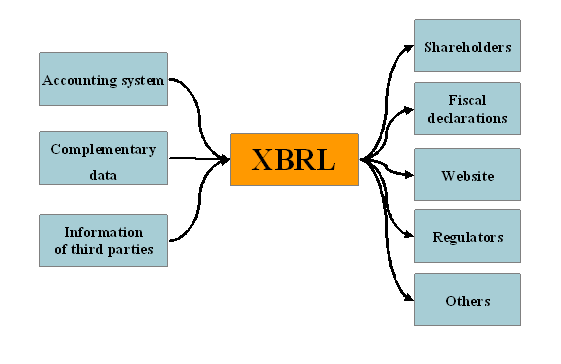What is XBRL?
XBRL is a standard developed specifically for the purpose of online financial reporting.
XBRL (eXtensible Business Reporting Language) is an open standard based on XML (Extensible Markup Language) for the collection and exchange of financial data online. The standard was originally developed by the Association of American Accountants to meet the specific requirements of internal and external financial reporting.
Similar to a dictionary
The principle of XBRL is to identify each concept (e.g. equity) and include it in a taxonomy. The latter is similar to a dictionary. The concepts thus gathered together in a structured manner can be further recognised, processed and represented in various ways. This is done based on the use to be made of them (e.g. “annual accounts” or “tax return”).
The flexibility of XBRL also makes it possible to draw on different taxonomies, each of which corresponds to a different accounting framework (such as, for example, the Belgian accounting framework or the IAS/IFRS accounting standards).
Many advantages
There are many advantages to using XBRL:
- XBRL increases the quality of reported data, as acts such as re-entry of data become unnecessary.
- XBRL facilitates not only the exchange of data in file format but also the processing and analysis of data.
- XBRL makes it possible to lower disclosure costs as the format allows data to be selected, reused and presented based on individual needs.

These optimisation and cost-saving possibilities can only be used to the fullest if as many different economic agents as possible take part in the uniformisation and standardisation of the exchange of data.
Businesses (data suppliers), regulators (data collectors) and analysts (data users) alike should thus participate.
Currently, the not-for-profit organisation managing the XBRL standard has more than 650 members worldwide. These include companies active at all levels of the information processing chain, regulators (including the Federal Deposit Insurance Corporation, the Securities and Exchange Commission), central banks (such as the Banco d'Espagne, the Bundesbank, and the National Bank of Belgium), software companies (such as Microsoft, IBM, SAP), analysts (Reuters, etc.) and accountancy and audit firms (PWC, KPMG, E&Y, Deloitte).
MORE INFO To learn more about XBRL, please visit the websites of XBRL Belgium and XBRL International.
